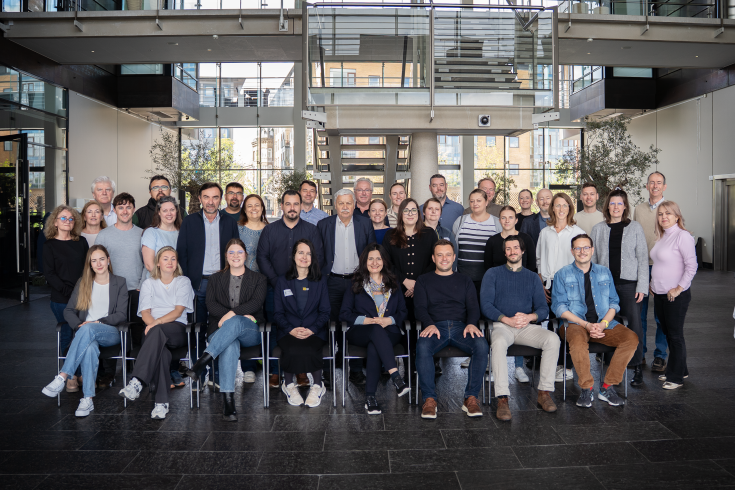DISCO Project Kicks Off with First Meeting in Denmark

On May 21–22, 2025, all ten DISCO project partners gathered in Aalborg, Denmark, for the project’s first physical meeting. Alongside local stakeholders invited by the partners, the two-day event marked the official launch of DISCO’s collaborative work to advance district heating and cooling (DHC) solutions that better utilize waste heat across Europe.
Setting the Stage for Sustainable District Heating and Cooling
As the demand for energy-efficient and low-carbon urban solutions grows, DHC systems—particularly those using industrial waste heat—offer significant environmental and economic benefits. Yet, progress is often hindered by complex regulations.
The Aalborg meeting served as a platform for policymakers, industry leaders, and other stakeholders to exchange insights and explore how regulatory frameworks can better support smart, efficient DHC networks.
Highlights from the Workshop Program
The agenda included an introduction to the DISCO project, partner presentations, and a look at Denmark’s advanced DHC landscape. Major themes included:
- Utilizing waste heat in DHC systems
- National regulatory frameworks and their impact
- Relevant EU policies such as the Energy Efficiency Directive and Renewable Energy Directive
A panel discussion encouraged partners to share experiences from their countries, while thematic roundtable workshops enabled deeper exploration of regulatory barriers and co-creation of policy recommendations.
Partner Insights from Aalborg
Here are some key takeaways from the partners who attended the meeting:
"Europe is full of success stories – it is up to us to share them and to learn from each other. The kick-off meeting in Denmark showed what opportunities there are in the area of waste heat utilization and towards which direction we all should aim at”
— Christian Engers, House of Energy, Germany
”The first DISCO Peer Review meeting, focused on the regulatory framework for integrating waste heat into district heating systems, offered IRENA a valuable opportunity to gain insights into DHC systems across partner countries—especially the Danish market, one of the most advanced in the EU. During the study visits, we were impressed by how various waste heat sources in Aalborg—such as the waste incineration plant and cement factory—are efficiently combined to supply heating and hot water”
– Andrea Poldrugovac, IRENA – Istrian Region Energy Agency, Croatia
"It became clear during the Peer Review that the financial aspect is a major bottleneck for many regions. The lack of national schemes or EU-level financing mechanisms when it comes to DHC networks and establishing the infrastructure, means that even strong local ambition can struggle to translate into action”
— Nikoline Bak, Green Hub Denmark, Aalborg Municipality, Denmark
Insightful Site Visits
Participants had the opportunity to see real-world applications of district heating and cooling during two site visits:
1. Aalborg Utility and Nordjyllandsværket Power Plant
This combined heat and power plant currently serves approximately 200,000 residents and is transitioning from coal to renewable energy sources. Currently, 30% of its heat comes from surplus heat recovered from Aalborg Portland’s cement factory, 25% from waste incineration at the nearby Nordværk facility, 10% from wind and solar and 35% from imported coal. By 2027, coal will be fully replaced by large-scale saltwater heat pumps and waste heat from the innovative e-SAF production at Project Fjord PTX, which also utilizes CO₂ captured from waste incineration at Nordværk.
2. Aalborg Portland Cement Factory
Here, district heating and cooling are supplied partly by a deep artificial chalk pit lake formed by historic mining activities. The lake’s cold water, between 5 and 13 °C, provides district cooling to Aalborg Hospital, IKEA, and other local businesses. Discussions at the site focused on the business case for integrating surplus heat into the district heating network and shared insights into the project’s design and implementation. The visit also included an introduction to early-stage carbon capture and storage initiatives, aiming to store 400,000 tons of CO₂ via pipeline at the Norne Carbon Storage Hub.
A Strong Start for DISCO
The Aalborg meeting laid a strong foundation for the years ahead, bringing together six public authorities and four energy agencies focused on shared learning and policy innovation. The involvement of local stakeholders enriched discussions and highlighted the importance of multi-level cooperation to overcome regulatory and financial challenges.
This was the first of several planned meetings. Starting with Aalborg Municipality, DISCO partners look forward to upcoming exchanges across Europe to explore best practices and strengthen collaboration throughout the DISCO network.
